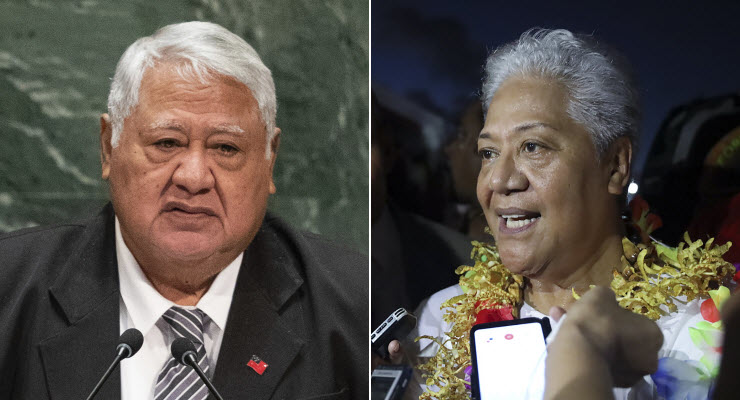
Despite an ongoing coup, life is normal for most Samoans.
“Just another day in paradise,” reporter Sapeer Mayron said. “People are still wonderful, politicians are going nuts.”
The small Polynesian nation held its election almost two months ago and there are two duelling parties who say that they should be allowed to form a government.
After polling day on April 9, caretaker prime minister Tuilaepa Sailele Malielegaoi’s Human Rights Protection Party (HRPP) and his former deputy Fiame Naomi Mata’afa’s new FAST party each ended up with 25 seats.
The single independent member chose to side with the FAST party, which gave them the majority. But a decision made by Samoa’s electoral commission based on a 2013 law that mandates that at least 10% of Samoa’s Parliament must be women gave HRPP another member, which led Malielegaoi to declare victory.
Following this, a new election to break the gridlock was declared and subsequently overturned in court. The electoral commission’s decision to appoint a new HRPP member was also overturned and the original election results upheld by the country’s supreme court.
Independent legal observer Fiona Ey said the courts have been a major part of the election’s aftermath.
“It’s all coming back to the courts and getting the courts to rule on the validity of what happened. There’s several court cases pending about the election, and other private proceedings from the caretaker prime minister,” she said.
Meanwhile, Mata’afa’s party went to Samoa’s Parliament House to officially form government — on the last possible day to do so according to the nation’s constitution — where they found the doors were locked by under orders from the current head of state.
Undeterred, FAST held an impromptu swearing-in in front of the building. People gathered under a big marquee, bringing tables and chairs for the ceremony.
“The sun was setting behind the tent, it was really beautiful. The lawyers explained to the public and everyone was sworn in. It didn’t take long, and it was met with huge, huge applause,” Mayron said.
Down the road, the HRPP was holding an event of their own. With members all dressed in blue, the event had a party-like atmosphere. Malielegaoi addressed the media and party members, telling them that he will remain the prime minister.
“Since the election, it’s been like a big old game of ping-pong. The ball keeps bouncing from one team to another, and no one knows where it’s going to go next,” Mayron said.
Malielegaoi has accused the judiciary of having conflicts of interest and said that he will only accept the election results if it results in his victory. He also accused Mata’afa and party members of treason.
“The prime minister’s actions are quite inconsistent because he’s going through the courts, he’s filing these actions to declare the swearing-in invalid,” Ey told Crikey.
According to Mayron, Samoans are continuing with their normal day-to-day activities. Government services have been unaffected by the political uncertainty. Unlike some other nations in the area, Samoa doesn’t have an army and the police have stayed out of the political fray.
The election comes after nearly 40 years of HRPP-led government, with half of that led by Malielegaoi. The party’s popularity began to drop after the government passed a controversial set of laws that removed the Supreme Court’s ability to see appeals over land ownership and chiefly titles.
Another blow to the government’s popularity was its handling of the COVID-19 pandemic. While the nation has remained free of the virus, there has been a backlash against the restrictive domestic public health orders that limited attendance at ceremonial events, reduced opening hours and banned people from going to the beach or doing other activities on Sundays.
These factors, combined with a young population who were targeted by FAST’s modern campaign tactics (using Facebook and rallies to gain support), led to the young party being neck-and-neck with the incumbents.
Ey said that Samoans have a lot of faith in the judiciary.
“Samoa is very hierarchical and deferential, and judges are respected. But the prime minister’s words have been chipping away at this. Even lawyers within the law society have been making public statements against the judiciary, which is extraordinary,” she said.
Her concern is that any decision could take a while to shake out. Both Ey and Mayron believe that FAST has legitimately won the election and should be allowed to govern.
But foreign nations have been slower to recognise this. Australia still has yet to take a side on who won.
“The swearing-in, as it was described, that occurred on May 24 is one of those issues to be considered. There is an application to have that declared unlawful,” Foreign Minister Marise Payne told ABC radio on Thursday morning.
“It’s disappointing that the international community is not taking a stand. The Australian and New Zealand statements have been very soft,” Ey said.
“The problem is there’s someone who’s trying very hard to stay in power and is undermining these institutions. It’s time for some stronger statements to come out of the international community.”








he will only accept the election results if it results in his victory.
He’s not Robinson Crusoe there.